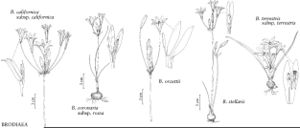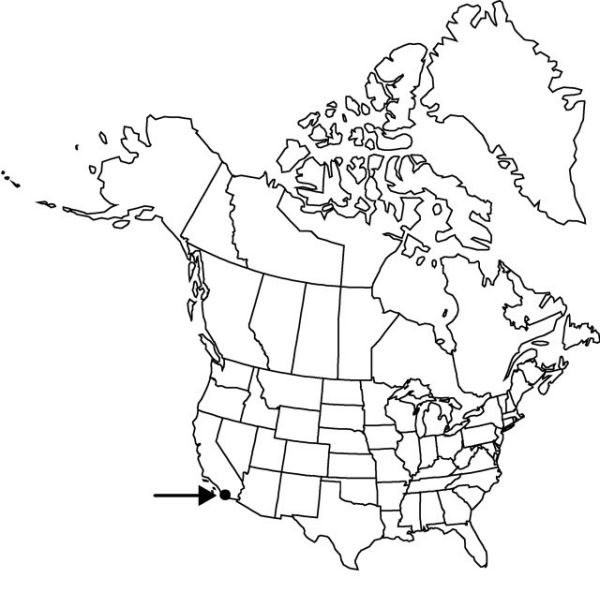Difference between revisions of "Brodiaea orcuttii"
Gard. Chron., ser. 3, 20: 214. 1896.
Common names: Orcutt’s brodiaea
Basionym: Hookera orcuttii Greene
Synonyms: Brodiaea filifolia var. orcuttii (Greene) Jepson Hookera multipedunculata Abrams
FNA>Volume Importer |
FNA>Volume Importer |
||
| Line 15: | Line 15: | ||
|name=Brodiaea filifolia var. orcuttii | |name=Brodiaea filifolia var. orcuttii | ||
|authority=(Greene) Jepson | |authority=(Greene) Jepson | ||
| − | }}{{Treatment/ID/Synonym | + | }} {{Treatment/ID/Synonym |
|name=Hookera multipedunculata | |name=Hookera multipedunculata | ||
|authority=Abrams | |authority=Abrams | ||
| Line 33: | Line 33: | ||
|elevation=0–1600 m | |elevation=0–1600 m | ||
|distribution=Calif. | |distribution=Calif. | ||
| − | |discussion=<p>Brodiaea orcutti is rare and endemic to southern California. It was once abundant on Kearney Mesa north of San Diego, but most of that area has been developed for housing, and only those portions on military reservations remain undisturbed. This is the only species in the genus with no staminodia.</p> | + | |discussion=<p><i>Brodiaea</i> orcutti is rare and endemic to southern California. It was once abundant on Kearney Mesa north of San Diego, but most of that area has been developed for housing, and only those portions on military reservations remain undisturbed. This is the only species in the genus with no staminodia.</p> |
|tables= | |tables= | ||
|references= | |references= | ||
| Line 57: | Line 57: | ||
|publication year=1896 | |publication year=1896 | ||
|special status= | |special status= | ||
| − | |source xml=https://jpend@bitbucket.org/aafc-mbb/fna-data-curation.git/src/ | + | |source xml=https://jpend@bitbucket.org/aafc-mbb/fna-data-curation.git/src/8f726806613d60c220dc4493de13607dd3150896/coarse_grained_fna_xml/V26/V26_657.xml |
|genus=Brodiaea | |genus=Brodiaea | ||
|species=Brodiaea orcuttii | |species=Brodiaea orcuttii | ||
Revision as of 16:46, 18 September 2019
Scape 8–25 cm, slender. Flowers 14–20 mm; perianth violet, tube funnelform, 3–7 mm, transparent, splitting in fruit, lobes widely spreading, 12–19 mm; filaments 4–6 mm; anthers linear, 4–6 mm, apex with V-shaped notch; staminodia absent; ovary 4–6 mm; style 7–11 mm; pedicel 1–5 cm. 2n = 24.
Phenology: Flowering spring (May).
Habitat: Grasslands near streams, vernal pools
Elevation: 0–1600 m
Discussion
Brodiaea orcutti is rare and endemic to southern California. It was once abundant on Kearney Mesa north of San Diego, but most of that area has been developed for housing, and only those portions on military reservations remain undisturbed. This is the only species in the genus with no staminodia.
Selected References
None.
Lower Taxa
None.

